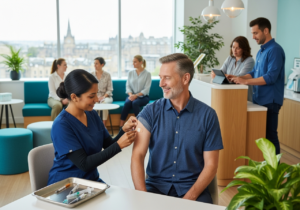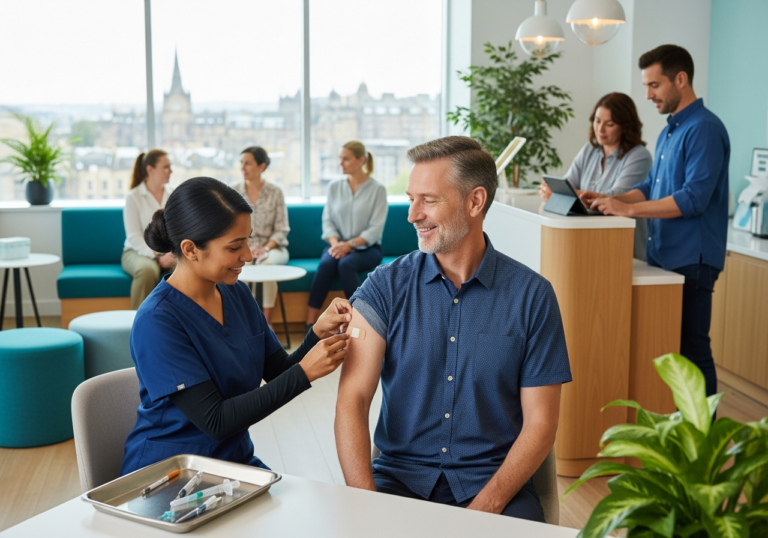FAQs on Dengue Fever Vaccine for Travel Safety
Dengue fever is a growing concern for travellers heading to tropical and subtropical regions. With cases on the rise, many are wondering whether they should get vaccinated before their trip. If you’re planning to visit a country where dengue is prevalent, understanding the dengue fever vaccine can help you make an informed decision about your health and safety.
Below, we answer some of the most frequently asked questions about the dengue fever vaccine, helping you prepare with confidence before you travel.
What is dengue fever, and how is it transmitted?
Dengue fever is a mosquito-borne viral infection caused by the dengue virus. It is primarily spread through the bite of infected Aedes mosquitoes, particularly Aedes aegypti. These mosquitoes are most active during the day, especially in urban and semi-urban areas.
Symptoms of dengue fever can range from mild flu-like illness to severe complications such as dengue haemorrhagic fever or dengue shock syndrome, which can be life-threatening. Since there is no specific treatment for dengue, prevention—including vaccination and mosquito bite avoidance—is essential.
Who should consider getting the dengue fever vaccine?
The dengue fever vaccine is recommended for travellers visiting high-risk areas, particularly those staying for extended periods or engaging in outdoor activities that increase mosquito exposure.
It is particularly advisable if you are travelling to regions with frequent dengue outbreaks, including parts of Southeast Asia, South America, Central America, the Caribbean, and Africa. Those who have previously had dengue fever may also benefit from vaccination, as subsequent infections can be more severe.
Which dengue vaccine is available for travellers?
Currently, the dengue vaccine available in the UK for travellers is Qdenga (TAK-003), which has been approved for use in individuals aged 4 and older. This vaccine provides protection against all four strains of the dengue virus and is designed to reduce the risk of severe illness.
Qdenga is administered as a two-dose series, with the second dose given three months after the first. Travellers should plan their vaccination schedule accordingly to ensure full protection before departure.
How effective is the dengue fever vaccine?
Clinical trials have shown that the Qdenga vaccine offers significant protection against dengue fever, particularly for individuals who have previously been exposed to the virus. Studies indicate that the vaccine reduces the risk of symptomatic dengue and severe complications. However, no vaccine is 100% effective, so additional preventive measures, such as using insect repellent and wearing protective clothing, remain crucial.
Are there any side effects of the dengue fever vaccine?
Like all vaccines, Qdenga can cause some side effects, though they are generally mild and temporary. Common side effects include:
– Pain, redness, or swelling at the injection site
– Headache
– Fatigue
– Fever
– Muscle aches
Severe allergic reactions are rare, but as with any vaccine, travellers should discuss any history of allergies or medical conditions with their healthcare provider before receiving the jab.
Can I still get dengue fever after being vaccinated?
Yes, while the vaccine significantly reduces the risk of infection and severe disease, it does not provide absolute immunity. Travellers should continue practising mosquito bite prevention by using insect repellents, wearing long-sleeved clothing, and staying in accommodations with mosquito nets or air conditioning.
How long does the protection from the vaccine last?
Research suggests that the Qdenga vaccine provides lasting immunity, but the exact duration of protection is still being studied. Current data indicates that individuals retain a strong immune response for several years after vaccination. There is no official recommendation for booster doses at this time, but ongoing research may provide further guidance in the future.
Is the dengue vaccine safe for pregnant or breastfeeding travellers?
The dengue vaccine has not been extensively studied in pregnant or breastfeeding individuals, so it is generally not recommended for these groups unless advised by a healthcare professional. If you are pregnant or breastfeeding and planning to travel to a dengue-endemic area, consult with a doctor to discuss alternative preventive measures.
How much does the dengue fever vaccine cost?
The cost of the dengue vaccine varies by clinic and location. As it is not part of the routine NHS vaccination schedule, travellers will need to obtain it through private vaccination clinics. To find out the current price and availability, it’s best to contact a travel health specialist.
Where can I get the dengue fever vaccine before travelling?
You can receive the dengue fever vaccine at specialised travel vaccination clinics such as the [Edinburgh Vaccination Clinic](https://edinburghvaccinationclinic.co.uk/travelvaccines/dengue-fever-vaccine/). It’s advisable to book your appointment well in advance of your trip to allow enough time for both doses.
Do I need a prescription to get the vaccine?
No, a prescription is not required, but a consultation with a travel health specialist is necessary to assess your suitability for the vaccine. Your healthcare provider will review your medical history and travel itinerary to determine if the vaccine is appropriate for you.
What other precautions should I take to prevent dengue fever?
In addition to vaccination, it’s important to take practical steps to reduce your risk of mosquito bites:
– Apply insect repellent containing DEET, picaridin, or oil of lemon eucalyptus.
– Wear light-coloured, long-sleeved clothing to cover exposed skin.
– Use mosquito nets if staying in areas without screened windows or air conditioning.
– Stay in accommodations with well-sealed doors and windows.
– Avoid areas with standing water, as these are breeding grounds for mosquitoes.
Combining vaccination with these preventive measures offers the best protection against dengue fever while travelling.
Final Thoughts
If you’re planning a trip to a region affected by dengue fever, considering the vaccine is a smart step towards safeguarding your health. While no vaccine offers complete immunity, Qdenga significantly reduces the risk of infection and severe illness.
To ensure you’re protected, consult with a travel health expert and schedule your vaccination in advance. Ready to take the next step? [Book your dengue fever vaccine appointment today](https://edinburghvaccinationclinic.co.uk/travelvaccines/dengue-fever-vaccine/) and travel with greater peace of mind.





